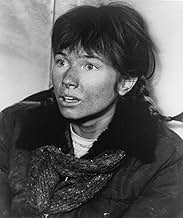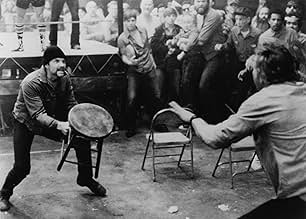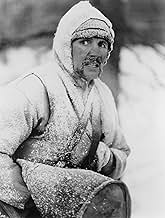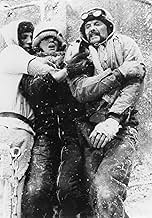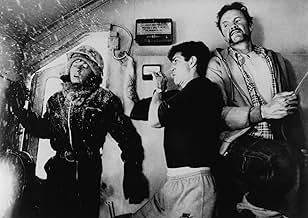Dois condenados fugitivos e uma operária ferroviária se encontram presos em um trem sem freios e ninguém dirigindo.Dois condenados fugitivos e uma operária ferroviária se encontram presos em um trem sem freios e ninguém dirigindo.Dois condenados fugitivos e uma operária ferroviária se encontram presos em um trem sem freios e ninguém dirigindo.
- Direção
- Roteiristas
- Artistas
- Indicado a 3 Oscars
- 2 vitórias e 8 indicações no total
- Al Turner
- (as Reid Cruikshanks)
- Old Con
- (as Norton E. 'Hank' Warden)
Avaliações em destaque
John Voight and the vastly underrated Eric Roberts play two cons who escape from a hellish gulag and board a train with no driver. Their struggle to stop the train and battle their own inner demons is the movie.
Konchalovsky creates a cold, alien, ethereal world inside the train that, in the oddest way, provides a haven for self-examination for the two leads. Rebecca de Mournay is layered into the mix, as is the indefatigable John P. Ryan as a prison warden who risks death to return his charges to custody, but the movie belongs to Voight and Roberts who both bring tremendous humanity to their finely sketched characters.
The final image is as powerful as cinema gets and marks RUNAWAY TRAIN as a modest masterpiece.
Though often criticized for producing cheap rubbish, the Cannon Group, in fact, also produced many fine films including this, 52 PICK-UP and MARIA'S LOVERS (also Konchalovsky).
Relentless and engrossing action film from start to finish, Runaway Train boasts two Oscar nominated performances from John Voight {Manny} and Eric Roberts {Buck} and no little intelligence with its well scripted characters. The opening quarter is pretty stock routine prison fare, these guys are tough, the warden is a bastard and we just know they are going to escape. But once the guys board the train the whole film shifts in gear and tone. The dynamic that exists between Manny & Buck, partners but very different in life approach, is riveting stuff courtesy of the nifty dialogue exchanges. Things are further enhanced by the appearance of Rebecca DeMornay's also stranded railway worker, Sara, who far from being a shoe-horned token female character, is the crucial piece of the emotional jigsaw. He presence gives the guys room to exorcise their demons and pour out their feelings of anger, bravado and mistrust.
The action scenes are very well handled by director Andrei Konchalovsky and his crew. As the train hurtles thru the snowy Alaskan wilderness we are treated to a number of crash bang wallops involving the train itself; derring-do from our boys on the icy outside of the locomotive, and a helicopter pursuit chartered by the obsessed John P. Ryan as Warden Ranken particularly stand out. Bona fide action sequences that are executed skilfully. Then we get to the finale, a finale pumped up for emotional impact, both visually and orally it closes the film justly. We even get time for a bit of Will Shakespeare as we go about reflecting on what we have just witnessed. A fine movie it be. 7.5/10
It's based on a screenplay by the legendary Akira Kurosawa -- knowing this makes a lot of the elements a bit more familiar; the snow, the hopelessness, the apocalyptic atmosphere -- and it's directed by Russian Andrei Konchalovsky, who after this film directed two Hollywood embarrassments called "Homer & Eddie" and "Tango & Cash" (apparently trying to corner the market on ampersands), and most recently helmed the acclaimed Armand Assante mini-series "The Odyssey" for television. "Runaway Train" is not a perfect film, some of the minor supporting performances are really awful and some viewers may find Eric Roberts to be irritating, but the sheer kineticism, among the other stronger elements, makes it worthwhile. Often called an intellectual action picture, it's more of an existential one, i.e. man versus a indifferent/hostile universe, etc. Everything in the film has a greater, more universal meaning, and it's not rocket science to figure out what stands for what. The simplicity of its metaphors doesn't dull the impact of "Runaway Train" as a sensory experience, though, because it's still pretty potent stuff. Provided you're not completely close-minded, this is one you'll remember for a long, long time.
It is hard to know what influence Kurosawa had on this, but one can guess. He had been through his rejection in Japan, suicide attempt and film made and financed by the Soviets. He subsequently arranged scant funding for this, started and was foiled. What we have now is supposedly completely reworked. But what we see is Soviet iconography in the trains and snow, and Shakespearean motion toward tragedy. (Kurosawa would do the Shakespearean "Ran" instead of this, and we are lucky for that.)
So this comment will not be on the acting, though Voight is not only superb, but inhabits the character as we fear we would. It is about the icons and the camera. I think we have inherited this from Akira.
The trains have been painted to be big flat black hulks, reshaped with plywood to resemble Soviet machines. We have a Soviet director. Early in the film, we have that train (four locomotives) hit the end of another, demolishing it. In the process, the front of our beast is turned into a ragged tear of heavy metal, racing madly through heavy snow, angry at the weather.
"Unstoppable" takes a few scenes from this: the hitting of the end of another train; the bridge that has the fatal speed limit; the "soldier" lowered from a chopper then pummeled. But it is an altogether different film. Scott is all about energy in the camera. Every scene moves in a dance that is composed. The rhythm and energy is in our eye. He works to give is narrative stances for that eye: TeeVee cameras, characters that are observers and others that comment on observation.
The train is only a prop, the characters only something to carry the narrative thrust. The art is in the eye, on our side of the wall.
This film has three animals: Voight's character, a convict driven to heroic madness, the opposing warden who is every bit as demented and colorful. Both of these are runaway trains, bested by the train itself which has agency of its own. It seems to have killed and ejected the engineer, enticed two convicts aboard, then gone mad, attracting the warden as well. It is "imprisoned" in a braid of rails, designed here to relate to the train as the remarkable prison building is to the humans.
All the cameras are static except the ones following the train, some of which race through the woods the same way we saw in "Rashoman."
It seems that like with "Star Wars," Kurosawa can bless a film by merely breathing on it.
Ted's Evaluation -- 3 of 3: Worth watching.
Você sabia?
- CuriosidadesDanny Trejo was visiting a friend who was working as a production assistant on the set when he was offered a job as an extra. Edward Bunker recognized Trejo because they served time in San Quentin State Prison together. Bunker helped Trejo get hired as Eric Roberts' boxing coach. Director Andrei Konchalovsky was so impressed with Trejo that he gave him a small role. Trejo later stated that he was staggered to find out that the coaching job earned him $320 per day, which was more than he had ever gotten from a robbery.
- Erros de gravaçãoSome have pointed out that the dead man's switch, a device intended for this exact situation, should have put on the brakes and stopped the train. Indeed it should have - however, it is explained in the film that the dead man's switch malfunctioned. Furthermore it has been pointed out that in a real situation the emergency brake application by the engineer would have switched the throttle to idle bringing the train to a stop. Although true, this shouldn't be considered a goof as factual accuracy would not allow further evolving of events.
- Citações
Manny: [after listening to Buck's dream] That's bullshit. You're not gonna do nothin' like that. I'll tell you what you gonna do. You gonna get a job. That's what you gonna do. You're gonna get a little job. Some job a convict can get, like scraping off trays in a cafeteria. Or cleaning out toilets. And you're gonna hold onto that job like gold. Because it is gold. Let me tell you, Jack, that is gold. You listenin' to me? And when that man walks in at the end of the day. And he comes to see how you done, you ain't gonna look in his eyes. You gonna look at the floor. Because you don't want to see that fear in his eyes when you jump up & grab his face, and slam him to the floor, and make him scream & cry for his life. So you look right at the floor, Jack. Pay attention to what I'm sayin', motherfucker! And then he's gonna look around the room - see how you done. And he's gonna say "Oh, you missed a little spot over there. Jeez, you didn't get this one here. What about this little bitty spot?" And you're gonna suck all that pain inside you, and you're gonna clean that spot. And you're gonna clean that spot. Until you get that shiny clean. And on Friday, you pick up your paycheck. And if you could do that, if you could do that, you could be president of Chase Manhattan... corporations! If you could do that.
Buck: Not me, man! I wouldn't do that kind of shit. I'd rather be in fuckin' jail.
Manny: More's the pity, youngster. More's the pity.
Buck: Could you do that kind of shit?
Manny: I wish I could.
- Cenas durante ou pós-créditos"No beast so fierce but knows some touch of pity." "But I know none, and therefore am no beast." Richard III - William Shakespeare
- Versões alternativasThe DVD mysteriously edits out the shot of the first helicopter policeman being run over by the wheels of the train. You see him crash into the train windshield and see him fall off, but then you see just a plain shot of the wheels. In all other versions of the film on video and laserdisc have a shot of this man's face coming right at the camera as his body is run over by the wheels of the train. Even the US TV version has a brief shot of this. This shot is present in the UK Arrow Films DVD release.
- ConexõesEdited into Con Express: Fora De Controle (2002)
- Trilhas sonorasGloria in D Major
by Antonio Vivaldi (as Vivaldi)
Performed by The USSR Academic Russian Chorus and the Moscow Conservatoire Students Orchestra
Principais escolhas
Detalhes
- Data de lançamento
- País de origem
- Idioma
- Também conhecido como
- El tren del escape
- Locações de filme
- Empresas de produção
- Consulte mais créditos da empresa na IMDbPro
Bilheteria
- Orçamento
- US$ 9.000.000 (estimativa)
- Faturamento bruto nos EUA e Canadá
- US$ 7.683.620
- Faturamento bruto mundial
- US$ 7.683.620
- Tempo de duração1 hora 51 minutos
- Cor
- Mixagem de som
- Proporção
- 1.85 : 1
Contribua para esta página




